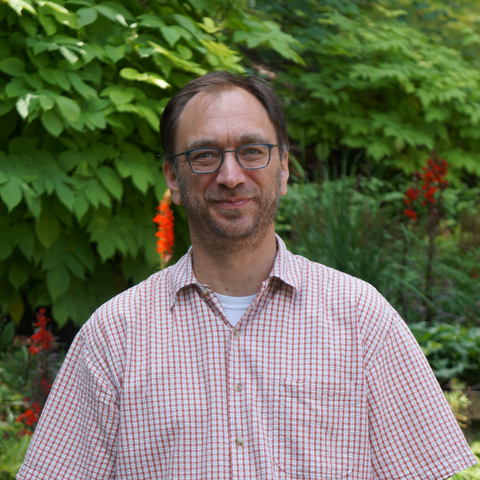
Assistant Director, Teaching
broschax@jmu.edu
Contact Info
Biography
Andreas Broscheid is the Assistant Director for Teaching at the Center for Faculty Innovation and professor of Political Science at JMU. His work is based on the firm belief that community is central to the vitality of a university and the success of its faculty. Andreas works to strengthen JMU's community of learners, scholars, and colleagues by coordinating and conducting programs that connect JMU faculty and help them clarify their career and life goals, make plans for achieving those goals while living a balanced life, document their successes, and build collegial networks.
Andreas has been a faculty member of the JMU political science department since 2006 and has taught classes on the government of the United States, particularly the courts, as well as on research methods. Between 2011 and 2013, Andreas was a faculty associate at the Center for Faculty Innovation, working largely on programs in the Scholarship of Teaching and Learning. Before coming to JMU, Andreas has taught at UNC Pembroke and conducted research at the Max Planck Institute for the Study of Societies in Cologne, Germany (his hometown).
In his spare time, Andreas sings (er, creates unrest in the back row of) The Oratorio Society of Virginia. You should all check out its next performances (see the website)! You should also read Andreas's blog, which he uses to discuss questions of teaching, learning, and faculty development.
Education
- Ph.D. in Political Science, Stony Brook University
- M.A. in Political Science, Stony Brook University
Courses Taught
- POSC 225, U.S. Government
- POSC 225H, U.S. Government Honors
- POSC 386, U.S. Judiciary
- POSC 295, Political Science Research Methods
Scholarship
Andreas's recent scholarship has focused on political science education and on inclusion in college classes. In an article published in the Journal of Political Science Education, Andreas asks whether the use of Team-Based Learning (TBL) in a large U.S. government class affects students' attitudes about group work. As a follow up to this work on TBL, Andreas is now looking at how to structure the content of a U.S. government survey course for TBL. Together with his CFI colleague Ed Brantmeier and with Carl Moore of the University of the District of Columbia, Andreas has co-developed a survey that helps faculty assess the extent to which their classes are inclusive and discover additional aspects of diversity and inclusion for their classes.
Andreas's political science research has focused on European interest representation and the U.S. courts, particularly the federal courts of appeals. What fascinates him in the U.S. courts of appeals is the fact that, unlike the U.S. Supreme Court, these courts operate in an environment of regional differences that creates the need to consider the preferences and legal arguments of a higher court as well as regional legal precedents. As a result, judges on these courts have to consider the Supreme Court's legal precedents and preferences as well as their own legal views and political preferences. In an article in the Law & Society Review, Andreas explores to what extent these factors lead to political differences between appeals courts in different circuits.
Select Publications
“Team-Based Learning in a Large Introductory U.S. Government Class.” Journal of Political Science Education 11(3): 319–31, 2015.
“Designing team-based learning activities.” In: J. Ishiyama, W.J. Miller, and E. Simon (eds.), Handbook on Teaching and Learning in Political Science and International Relations, Edward Elgar: Cheltenham, UK, 340-351, 2015.
“Comparing Circuits: Are Some U.S. Courts of Appeals More Liberal or Conservative Than Others?” Law & Society Review 45: 171-194, 2011.
“Bayesianische Ansätze zur Analyse kleiner Fallzahlen [Bayesian approaches for the analysis of small data sets].” In: P. Kriwy and C. Gross (eds.), Klein aber fein! Quantitative empirische Sozialforschung mit kleinen Fallzahlen, VS Research: Wiesbaden, 43-64, 2009.
“Ist das neunte amerikanische Berufungsgericht liberaler als die anderen Bundesberufungsgerichte? [Is the Ninth Circuit Court of Appeals more liberal than the other circuit courts?].” In: P. Kriwy and C. Gross (eds.), Klein aber fein! Quantitative empirische Sozialforschung mit kleinen Fallzahlen, VS Research: Wiesbaden, 269-292, 2009.
“Lobbying Activity and Forum Creation in the EU: Empirically Exploring the Nature of the Policy Good” (with David Coen). Journal of European Public Policy 14: 346-365, 2007.
“Der Bayesianische Analyse-Ansatz [The Bayesian approach to data analysis].” In: J. Behnke et al. (eds.), Methoden der Politikwissenschaft, Baden-Baden: Nomos, 47-57, 2006.
“Distributional and informational models of business-government interaction.” In: David Coen and Wyn Grant (eds.), Business and Government: Methods and Practice, Berlin: Leske & Budrich, 79-108, 2006.
“Ending cooperation: A formal model of organizational change in German pharmaceutical interest representation.” MPIfG Discussion Paper 05/9, 2005.
“Zur statistischen Analyse von Vollerhebungen [On the statistical analysis of apparent populations]” (with Thomas Gschwend). Politische Vierteljahresschrift 46: 16-26, 2005.
“Medical Doctors” (with Paul Teske). In: Paul Teske (ed.), Regulation in the States, Washington, D.C.: Brookings: 151-164, 2004.
“Public members on medical licensing boards and the choice of entry barriers” (with Paul Teske). Public Choice 114: 445-459, 2003.
“Insider and outsider lobbying of the European Commission: An informational model of forum politics” (with David Coen). European Union Politics 4 (2): 165-189, 2003.
